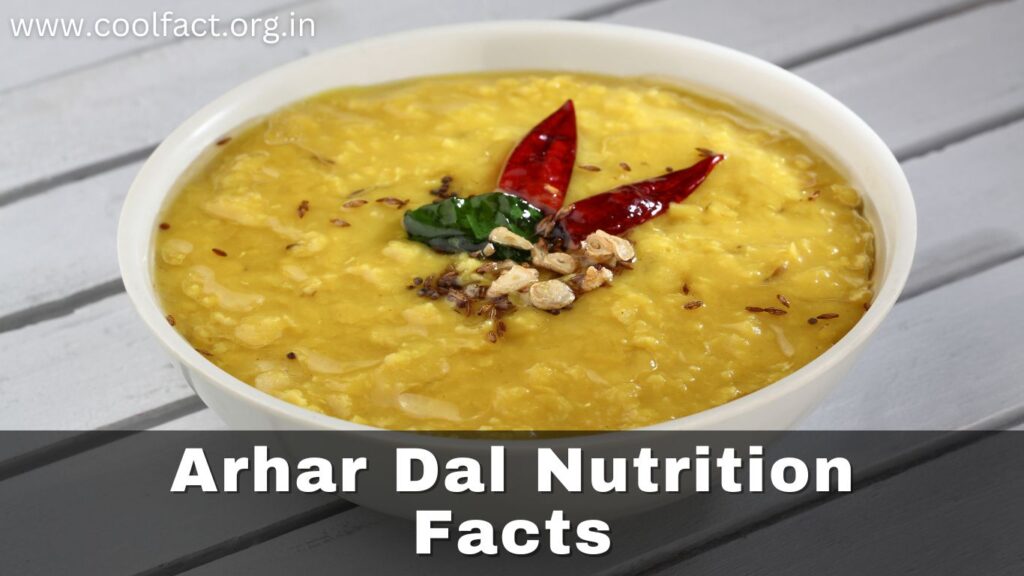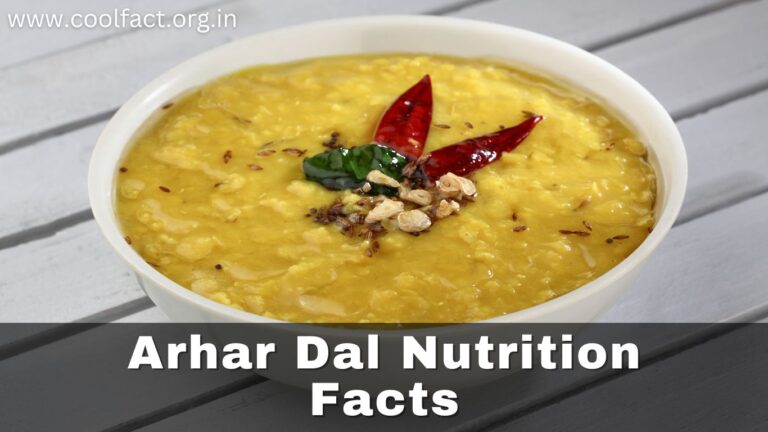Arhar Dal Nutrition Facts: Arhar Dal, scientifically referred to as Cajanus cajan and commonly known as pigeon pea or toor dal, constitutes a cornerstone of Indian culinary traditions and dietary regimens. Renowned for its distinctive earthy flavor and creamy consistency, this legume provides an exemplary balance of essential macronutrients and micronutrients that contribute significantly to human health. Its versatility extends beyond its gastronomic applications, underscoring its role as a nutritional powerhouse in addressing diverse dietary needs.

Arhar Dal Nutrition Facts
Nutritional Value of Arhar Dal (Per 100g)
| Nutrient | Amount |
|---|---|
| Energy | 343 kcal |
| Protein | 22g |
| Carbohydrates | 63g |
| Dietary Fiber | 15g |
| Total Fat | 1.5g |
| Calcium | 50mg |
| Iron | 3.9mg |
| Potassium | 731mg |
| Magnesium | 130mg |
| Vitamin B6 | 0.5mg |
3 Science-Backed Rationales for Protein’s Role in Human Health
- Tissue Anabolism and Repair: Proteins serve as the foundational substrate for the synthesis and repair of tissues, encompassing muscular, dermal, and organ systems. This anabolic property is especially critical in post-trauma recovery and during heightened physical exertion.
- Metabolic Optimization: Protein consumption augments thermogenic activity, thereby facilitating enhanced metabolic rates. This not only supports weight management but also improves overall caloric utilization.
- Immunological Efficacy: The synthesis of immunoglobulins and other defense-related molecules is intrinsically dependent on dietary protein, underscoring its indispensable role in maintaining immunocompetence.
10 Documented Health Benefits of Arhar Dal
- Protein Enrichment: Provides a high-quality source of plant-based protein essential for cellular and systemic functions.
- Cardiovascular Regulation: The substantial potassium content contributes to the maintenance of normotensive states, mitigating hypertension risks.
- Digestive Efficacy: Abundant dietary fiber supports gastrointestinal motility and microbial balance.
- Adiposity Control: Synergistic effects of protein and fiber confer satiety, reducing caloric overconsumption.
- Glycemic Stability: The complex carbohydrate matrix ensures a gradual glucose release, stabilizing blood sugar levels.
- Skeletal Fortification: Micronutrients like calcium and magnesium bolster bone density and prevent osteoporosis.
- Hematological Benefits: Iron facilitates erythropoiesis, combating anemia effectively.
- Dermatological Advantages: Vitamin B6 aids in maintaining healthy skin by supporting enzymatic reactions involved in cellular renewal.
- Cognitive Enhancement: Magnesium’s neuroprotective properties improve memory and cognitive resilience.
- Antioxidant Protection: Bioactive compounds neutralize oxidative stress, safeguarding against cellular damage.
Also Read:
How Much Protein in 100g Soya Chunks? Unlock Its Nutritional Power
5 Innovative Methods for Dietary Integration of Arhar Dal
- Traditional Dal Tadka: A robust preparation infused with aromatic spices and ghee, paired with rice or flatbreads.
- Nutritive Khichdi: A balanced amalgamation of rice, lentils, and vegetables, offering a wholesome one-pot meal.
- Creamy Dal Soup: A blended variation enriched with herbs and mild spices, ideal for a light yet nourishing option.
- Stuffed Flatbreads: Incorporate spiced dal as a nutrient-dense filling for parathas or rotis.
- Protein-Infused Salads: Toss cooked dal with seasonal vegetables, citrus dressings, and herbs for a refreshing protein boost.
Top 5 FAQs on Arhar Dal Nutrition Facts:
- Can Arhar Dal facilitate weight loss? Yes, its high protein-to-fiber ratio promotes prolonged satiety, aiding in caloric control and weight management.
- Is Arhar Dal suitable for individuals with diabetes? Certainly, as its complex carbohydrate profile ensures stable postprandial glycemic responses.
- Why is soaking Arhar Dal recommended before cooking? Soaking minimizes anti-nutritional factors such as phytic acid, enhancing bioavailability and digestibility.
- Does Arhar Dal contribute to gastrointestinal discomfort? While some individuals may experience bloating, pre-soaking and thorough cooking mitigate this issue.
- What is the optimal storage duration for Arhar Dal? When stored in an airtight container in a cool, dry environment, Arhar Dal retains its quality for up to 12 months.
Conclusion
Arhar Dal Nutrition Facts: Arhar Dal exemplifies the intersection of culinary tradition and nutritional science, serving as a versatile and indispensable dietary staple. Its comprehensive nutrient profile, coupled with its myriad health benefits, underscores its significance in both preventative and therapeutic nutrition. By incorporating Arhar Dal into daily meals, one can achieve a balanced diet that aligns with holistic health objectives. For more insights and resources, visit coolfact.org.in and explore the multifaceted dimensions of nutrition.
